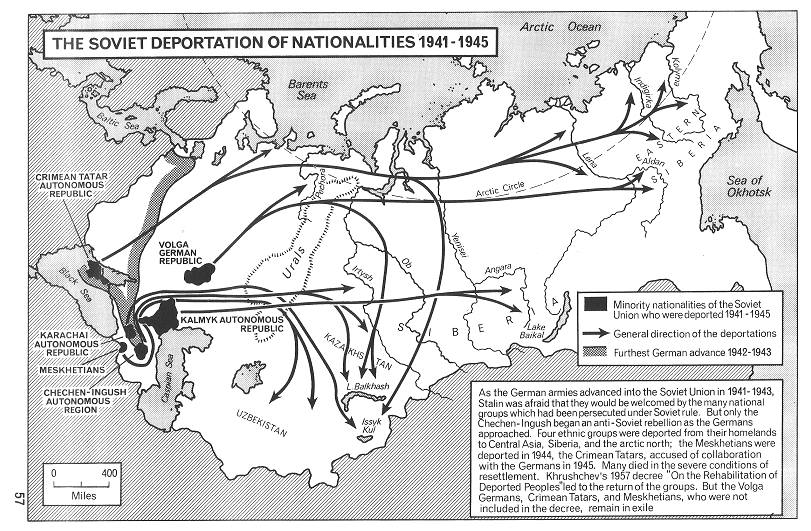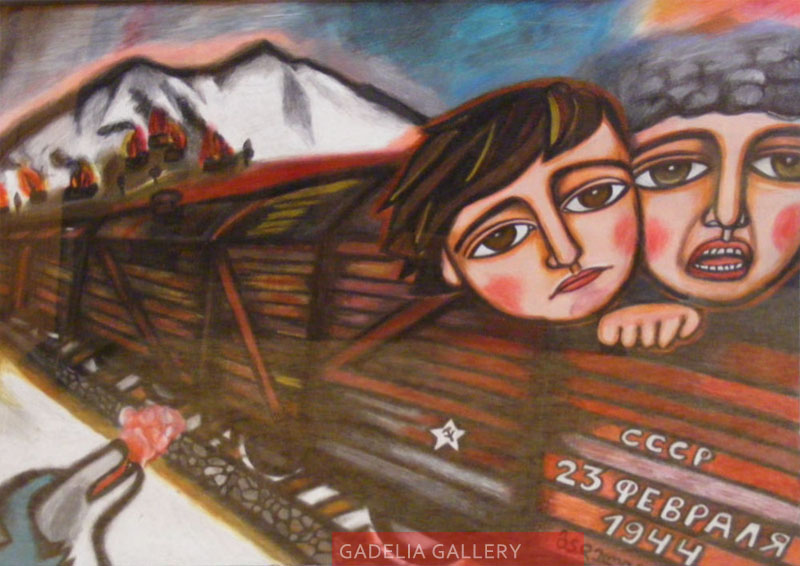STALIN'S CAUCASUS CRIMES
That Putin Wants You to Forget
by James Oliver, Euromaidan Press
On February 23, the Chechen and Ingush peoples of Russia's North Caucasus commemorated a tragedy in their history—the start of the Soviet deportation in 1944. Initiated by Stalin and supervised by his intelligence chief Lavrentiy Beria, it was carried out by a force of approximately 120,000 NKVD officers that would round up and expel 478,479 people. Today, Vladimir Putin is trying to suppress this history.
Exploring the Caucasus is akin to exploring a mini-continent with its many diverse ethnic groups and cultures all contained within a small geographic region. Here the historical forces of East, North and South collide.
To the Northeast we have Kalmykia, the only majority Buddhist region in the whole of Europe. Like the Tatars, the Kalmyks were swept along from their far-east homeland to their present-day location by the might of Genghis Khan and the Mongolian Empire. To the Northwest we have the Kuban. Formerly a majority Ukrainian area, the Kuban region has since been thoroughly Russified, its Ukrainian identity practically all but stamped out. Much of this is the result of the Holodomor as well as the policies of the Kremlin since. To the South we have Georgia, the birthplace of Stalin himself. According to one survey in 2013, half of all Georgians still possess "a positive attitude towards Stalin." However, if you believe this BBC report, younger generations of Georgians are not as enthusiastic about the tyrant as their parents and grandparents. Surveys also show that the vast majority of Georgians want to join NATO and the EU, not surprising given what Putin did to Georgia in 2008.
North of Georgia we have the Russian-controlled Caucasus, home to many ethnic groups, including the Chechens, the Ingush, the Balkars, the Circassians. It is here that the legacy of Stalin's policies loom large still today.
The Caucasus were one of the main focal points of the clashes between the Russian Empire and its great rival, the Ottoman Empire. The result was a cultural legacy of Islam among the aforementioned ethnic groups as well a continuing cultural sense of unease. Token resistance to the Russian annexations of the North Caucasus areas previously controlled by the Ottomans resulted in the Circassian genocide of 1854-56. General Nikolai Evdokimov, who led the Russian forces that conducted the genocide, described his actions as "ochishchenie." This was perhaps the first instance where the term "cleansing" was used as a euphemism for genocide. In this genocide, an estimated 600,000 people succumbed to shooting, starvation and forced emigration—three quarters of the Circassian population. Under Stalin, things would not be any better for the peoples of the North Caucasus.
Between 1942-44 the North Caucasus once again played host to a clash of two empires—Nazi Germany and the Soviet Union. What attracted the Germans to this part of the world was the allure of oil. Ninety percent of the oil supply for the Soviet Union came from the Caucasus, significantly Azerbaijan, whose capture would severely choke the Soviet war effort. Hitler considered the Caucasus to be of such high priority that he told his generals on June 1, 1942, "If I do not get the oil of Maikop and Grozny, then I must end this war." Although in the end he failed to capture Grozny, the Chechen capital, he continued the war. The reason for his failure is often attributed to Hitler splitting his forces in the name of capturing a city on a map he had noticed by chance. That city was called "Stalingrad."
Other than the distraction of Stalingrad, the plans for capturing the Caucasus entailed a deep thrust to Grozny, which needed local collaborators. To this end, the Nazis printed numerous propaganda posters for a hearts-and-minds campaign waged to try and convince locals to join.
Simultaneously but unrelated to the German advance into Russia, an anti-communist insurgency erupted across the Chechen-Ingush Autonomous Soviet Socialist Republic. To be sure, the Germans would come to learn about it, and try to convince the Chechen rebels to join their side, but to little effect. But, as we have seen before, to Stalin the details mattered little; bogus pretexts for targeting entire ethnic groups, however, did. And to Lavrentiy Beria, the man who would personally oversee the punishing of the Chechen and Ingush peoples, they were all tantamount to "German saboteurs."
This, together with their "anti-communism," formed the pretextual basis for their deportation, which began on February 23, 1944. Beria and his NKVD officers rounded up and expelled 478,479 people from their homes and sent them to Kazakhstan and the Asiatic steppes. "Because no Chechens or Ingush were to be left behind, people who could not be moved were shot. Villages were burned to the ground everywhere; in some places, barns full of people were burned as well," wrote historian Timothy Snyder.
This pretext was a recurring theme in Stalin's deportations. On December 28, 1943, Supreme Soviet Presidium chairman Mikhail Kalinin signed a decree ordering wholesale deportation of the Kalmyks, another North Caucasus people, based on the assumption that "many Kalmyks [had] betrayed their Motherland" by assisting the Germans. Between 1943 and 1944 more than 120,000 Kalmyks were to be forced out of their homes. When the Soviets came to deport the Crimean Tatars in May 1944, they again used the same pretext, and expelled 200,000 Tatars.
Despite claims that USSR embraced "internationalism," in reality nationality and ethnicity always mattered. It didn't matter that many Kalmyks, Tatars or Chechens had fought in the Red Army too. In the words of historian Simon Sebag-Montefiore, Stalin "certainly carried all the traditional Georgian prejudices against the Muslim peoples of the Caucasus whom he was to deport." And that's not only true for the peoples of the Caucasus. Throughout his reign as ruler of the USSR, Stalin absorbed Russian nationalism, and by doing so absorbed all the traditional hatreds and prejudices against other peoples that went along with it.

The deportation of the Chechen and Ingush peoples was part of Stalin's great deportation plan of ethnic minorities in the USSR:
900,000 Soviet Germans, 89,000 Finns deported in 1941 & 1942
69,267 Karachais deported to Central Asia 19 Nov 1943
91,919 Kalmyks deported to Siberia 28–29 Dec 1943
478,479 Chechen and Ingush peoples deported to Siberia on 23 Feb 1944
37,107 Balkars deported to Kazakstan on 8–9 Mar 1944
180,014 Crimean Tatars deported to Uzbekistan on 18–20 Mar 1944
91,095 Meshketian Turks deported from Soviet Georgia later in 1944
(Figures via Timothy Snyder).
These crimes against humanity form yet another stain against the former USSR and its predecessor, the Tsarist Russian Empire—both of which today's Russian leader Vladimir Putin expressly admires. Against this background, it is unsurprising, then, that Putin has continued the legacy of repressive measures regarding any attempt at commemorating these historic events. This was evident in 2014, when Crimean Tatars were not allowed to mark the 70th Anniversary of the 1944 deportations. It was also evident when Putin banned a motion picture about the Chechen deportations on the grounds it was "historically false."
It is precisely for these reasons, that the stories of Russia's ethnic deportations are worth telling.
———
This story first appeared Feb. 26, 2015 on Euromaidan Press.
From our Daily Report:
Russia upholds Chechen-Ingush border agreement
CounterVortex, Dec. 16, 2018
Eid terror in Ingushetia (with background on North Caucasus deportations)
CounterVortex, Aug. 20, 2012
Circassians call for boycott of Sochi Olympics
CounterVortex, Feb. 1, 2014
Exiled Crimean Tatar TV threatened with silence
CounterVortex, Jan. 26, 2020
See also:
‘RUSSIAGATE,’ SYRIA AND THE LEFT
by Terry Burke
CounterVortex, June 2019
WAR IN UKRAINE
The View from the East Village
by Bill Weinberg, The Villager
CounterVortex, September 2016
CONSCIENTIOUS OBJECTION IN RUSSIA
The Chechnya War and the Right Not to Kill
from War Resisters International
CounterVortex, February 2007
NAGORNO-KARABAKH:
Stalin’s Shadow Looms Over Trans-Caucasus Pipeline
by Rene Wadlow
CounterVortex, February 2007
—————————-
Reprinted by CounterVortex, Feb, 23, 2020


















Recent Updates
1 day 26 min ago
1 day 56 min ago
1 day 1 hour ago
1 day 1 hour ago
1 day 1 hour ago
1 day 2 hours ago
1 day 2 hours ago
1 day 2 hours ago
1 day 3 hours ago
1 day 4 hours ago